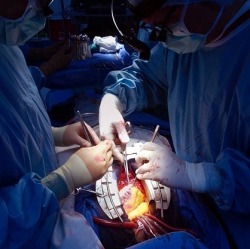
Researchers have created an artificial lung that has the potential to significantly improve the process of developing treatments for lung cancer. In addition to the possibility of replacing animal trials, the "3D-lung" could be used to expand our understanding of how lung cancer spreads to the rest of the body.
With a volume of just half a cubic centimeter, the mini-lung has is made up of human lung cancer cells growing on tissue and is attached to a bioreactor that makes it "breathe" by pumping a nutrient medium through its blood vessels. The model is therefore able to react to medication the same as real human patients.
“We’ve developed an innovative 3D test system that allows us to superbly simulate what happens in the human body," says Professor Dr. Heike Walles of the Regenerative Technologies for Oncology project group responsible for the model. "Animal models may be the best we have at the moment, but all the same, 75 percent of the drugs deemed beneficial when tested on animals fail when used to treat humans.”
